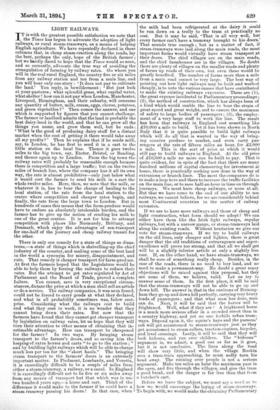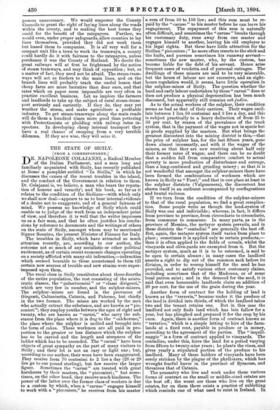LIGHT RAILWAYS.
IT is with the greatest possible satisfaction we note that the Times has begun to advocate the adoption of light railways, or rural steam-tramways, as a means of helping English agriculture. We have repeatedly declared in these columns that, in cheap steam-traction along the roads, lay the best, perhaps the only, hope of the British farmer ; but we hardly dared to hope that the Times would so soon, and so earnestly, advocate the true way of avoiding the strangulation of farming by railway rates. Go where you will in the real rural England, the country five or six miles from any railway station and ten from a main line, and you will hear only one story : It does not pay to cultivate the land.' You reply, in bewilderment : But just look at your pastures ; what splendid grass, what capital water, what shelter ! how can it not pay when London, Manchester, Liverpool, Birmingham, and their suburbs, will consume any quantity of butter, milk, cream, eggs, cheese, potatoes, and green vegetables ? ' Then comes the answer, and one which is supported by figures that you cannot challenge. The farmer or landlord admits that the land is probably the best dairy-land in the world, and that he can grow all the things you name, and grow them well, but he ends : What is the good of producing dairy stuff for a distant market when the cost of getting it there would take away all my profits ?' Then he explains that if he sends milk, say, to London, he has first to send it in a cart to the little station on the local line. Thence it goes twelve miles to the big town, say, Exeter. Bristol, or Reading, and thence again up to London. From the big town the railway rates will probably be reasonable enough because there is competition and a large traffic ; but on the twelve miles of branch line, where the company has it all its own way, the rate is almost prohibitive—only just below what it would cost the farmer to send his milk in a cart the whole twelve miles. Here, then, we note that the milk, or whatever it is, has to bear the charge of hauling to the local station, of the rate from the local station to the centre where competition and cheaper rates begin, and finally, the rate from the large town to London. But in hundreds of cases this means that the farm-produce would have to endure an absolutely intolerable burden, and the farmer has to give up the notion of sending his milk to one of the great centres. It is not for him to attempt competition with places like Normandy, Brittany, and Denmark, which enjoy the advantages of sea-transport for one-half of the journey and cheap railway transit for the other.
There is only one remedy for a. state of things so dims- trous,—a state of things which is shrivelling-up the chief industry of the country, and making some of the best land in the world a synonym for misery, disappointment, and ruin. That remedy is cheaper transport for farm-produce.
At first the farmers hoped that the Legislature would be able to help them by forcing the railways to reduce their rates. But the attempt to get rates regulated by Act of Parliament and the Board of Trade, proved a complete failure. You cannot, save in very exceptional circum- stances, dictate the price at which a man shall sell an article or do a service. The railway companies, it was soon found, could not be forced to carry goods at what they declared, and what in all probability sometimes was, below cost- price. Considering what the railways cost to build and what they cost to work, it is no wonder that they cannot bring down their rates. But now that the farmers have found that they cannot get cheaper transport by legislation on railway rates, let us hope that they will turn their attention to other means of obtaining that in- estimable advantage. How can transport be cheapened for the farmer ? In two ways. By bringing steam transport to the farmer's doors, and so saving him the keeping of extra horses and carts " to go to the station ; " and by building light railways which will be able to charge much less per ton for the " short hauls." The bringing steam transport to the farmers' doors is an extremely important matter. In Piedmont, Lombardy, and Venetia, it is exceedingly difficult to be a couple of miles from either a steam-tramway, a railway, or a canal. In England it is exceedingly difficult not to be five or six miles away from any means of transport but that which was in use two hundred years ago,—a horse and cart. Think of the difference it would make to the farmer if he could have a steam tramway passing his doors ! In that case, when the milk had been refrigerated at the dairy it could be run down on a trolly to the tram at practically no cost. But it may be said, ' That is all very well, but every farmer can't have a tramway brought to his doors.' That sounds true enough ; but as a matter of fact, if steam-tramways were laid along the main roads, the most important farms would virtually have steam transport at their doors. The chief villages are on the main roads, and the chief farmhouses are in the villages. No doubt there are plenty of villages on the smaller roads and plenty of farms up roads of their own, but even these would be greatly benefited. The number of farms more than a mile from a main road cannot be very large. The best way of pointing out how light railways may be built and worked cheaply, is to note the various causes that have contributed to make the existing railways expensive. These are (I), the great expense incidental to Parliamentary proceedings ; (2), the method of construction, which has always been of a kind which would enable the line to bear the strain of great speed and great weight, and to ensure the maximum of safety to large bodies of passengers ; (3), the employ- ment of a very large staff to work the line. The result has been that railways in England cost something like £10,000 a mile to build. Yet it has been shown in North Italy that it is quite possible to build light railways which will do all that is wanted in the way of bring- ing country produce to market, and even carry pas- sengers at the rate of fifteen miles an hour, for £2,000 a mile. This is the sort of price at which it would still pay to build railways in England. At the old price of £10,000 a mile no more can be built to pay. That is quite evident, for in spite of the fact that there are many hundred millions of capital clamouring for investment at home, there is practically nothing now done in the way of extensions or branch lines. The most the companies do is to make a loop here and there to increase the traffic facilities on the main line, or to save half-an-hour in time on through journeys. We must have cheap railways, or none at all. But that we have come to the end of our ability to use railways, we cannot believe, for we are considerably behind most Continental countries in the matter of railway extension.
If we are to have more railways and those of cheap and light construction, what form should we adopt? We can either have them like the Irish light railways, regular railways, but with a narrow gauge, or steam-tramways laid along the existing roads. Without hesitation we give our vote for steam-tramways. If we try to build railways on the old lines, only cheaper and lighter, there is great danger that the old traditions of extravagance and super- excellence will prove too strong, and that all we shall get will be a slightly inferior article at only a slightly less cost. If, on the other hand, we have steam-tramways, we shall be sure of something really cheap. Besides, in the case of the roads, there is no need to buy land, and no need to make a permanent-way. No doubt a great many objections will be raised against this proposal, but they are none of them, we believe, valid. Let us try to answer some of them. In the first place, it will be said that the steam-tramways will not be able to go up and down hill. The answer is, that in the environs of Birming- ham they go up and down bill perfectly, carrying very heavy loads of passengers ; and that what man has done, man can do. Next, it will be said that the horses will be frightened. Well, what if they are ? A frightened horse is a much more serious affair in a crowded street than in a country highway, and yet no one forbids urban tram- ways. Depend upon it, the squire's bays and the parsons' cob will get accustomed to steam-tramways just as they got accustomed to steam-rollers, traction-engines, bicycles, and level crossings. Lastly, it will be said that they will look hideous, and run over children. The " hideous " argument is, we admit, a good one as far as it goes, but it is not conclusive. The lines along the road will show very little, and when the village Ruskin sees a tram-train approaching, he must sadly turn his head away. The running over people is not a serious argument. Make ten miles an hour the maximum pace in the open, and five through the villages, and give the tram a good break, and the danger is far less than that from a. butcher's cart.
Before we leave the subject, we must say a word as to how we would encourage the laying of steam-tramways. To begin with, we would make the obtaining Parliamentary powers unnecessary. We would empower the County Councils to grant the right of laying lines along the roads within the county, and to making .the best terms they could for the benefit of the ratepayers. Further, we would even, under proper safeguards, allow counties to lay lines themselves, provided they did not work them but leased them to companies. It is all very well for a compact unit like a town to work its tramways, a county could hardly do it with fairness to the ratepayers, unless perchance it was the County of Rutland. No doubt the great railways will at first be frightened by the notion of steam tramways, and may think of opposition ; but, as a matter of fact, they need not be afraid. The steam-tram- ways will act as feeders to the main lines, and on the branch lines will probably teach the useful lesson that cheap fares are more lucrative than dear ones, and that rates which on paper seem impossible are very often in practice excellent business. Let us implore the farmers and landlords to take up the subject of rural steam-trans- port seriously and earnestly. If they do, they may yet weather the storm, and make agriculture a profitable industry. To get steam-tramways along the main roads will do them a hundred times more good than pottering with Protectionists or plodding with railway rates in- spectors. In developing cheap internal transport they have a real chance of escaping from a very terrible dilemma. If they are wise, they will seize it.



































 Previous page
Previous page